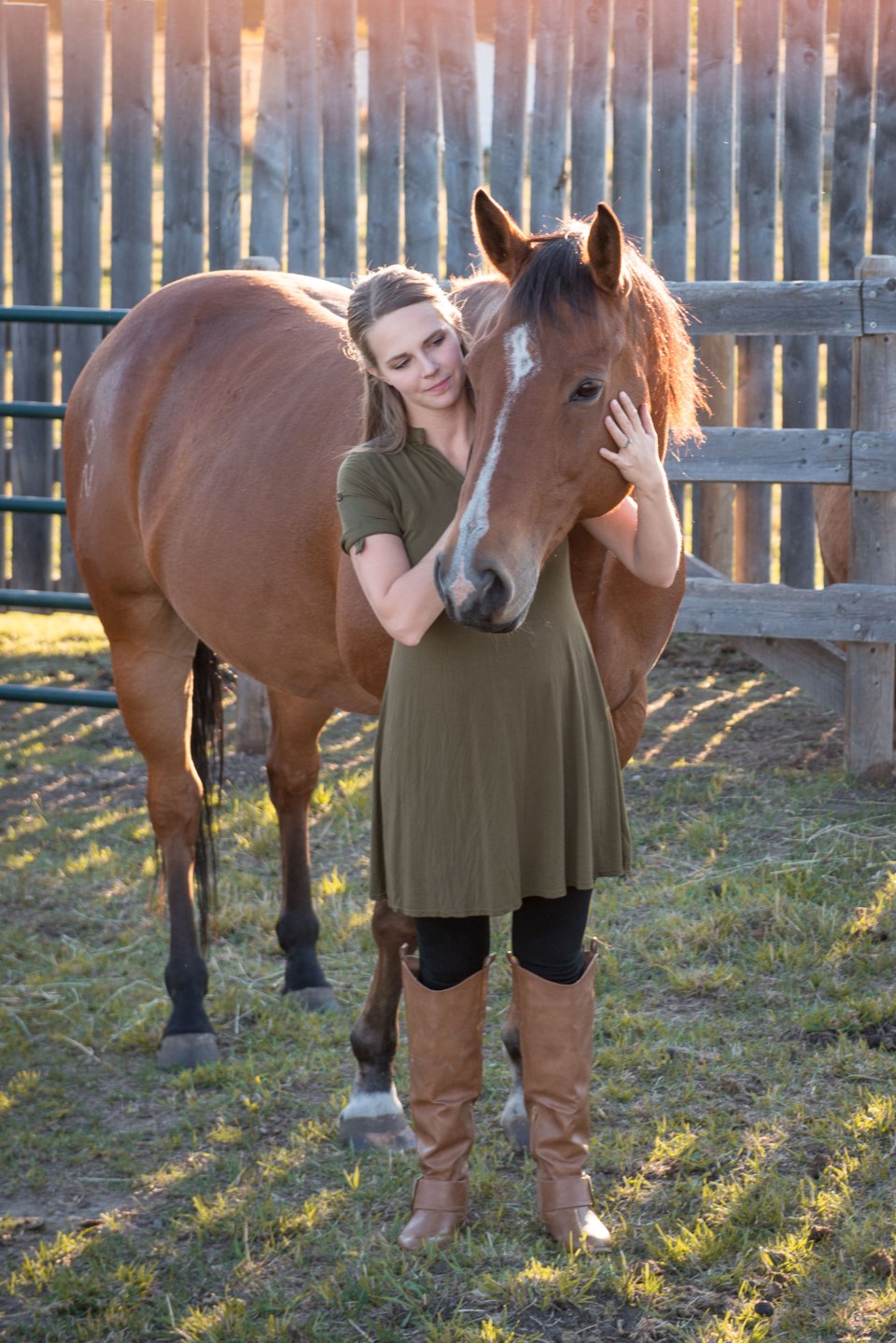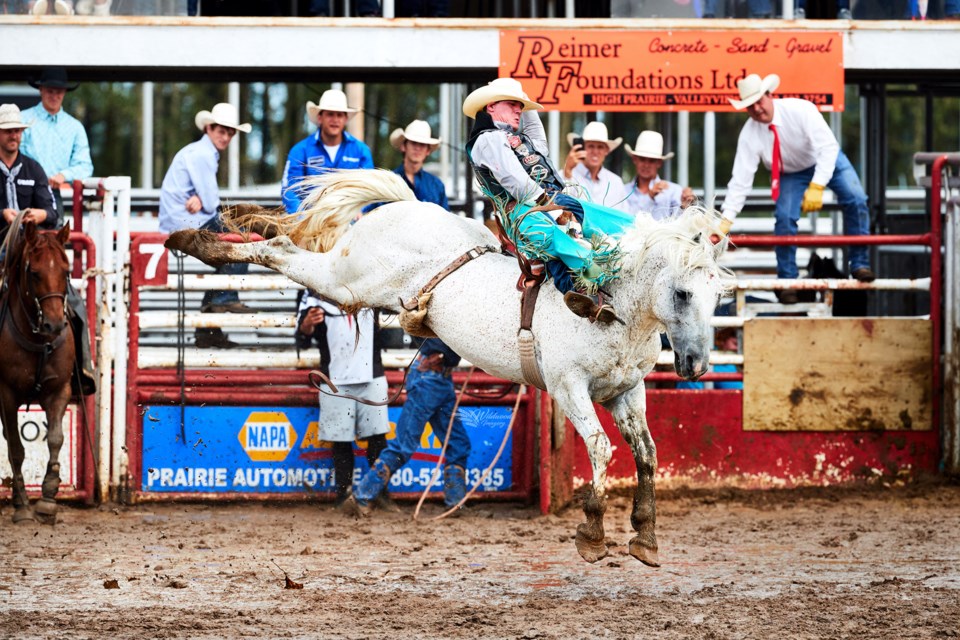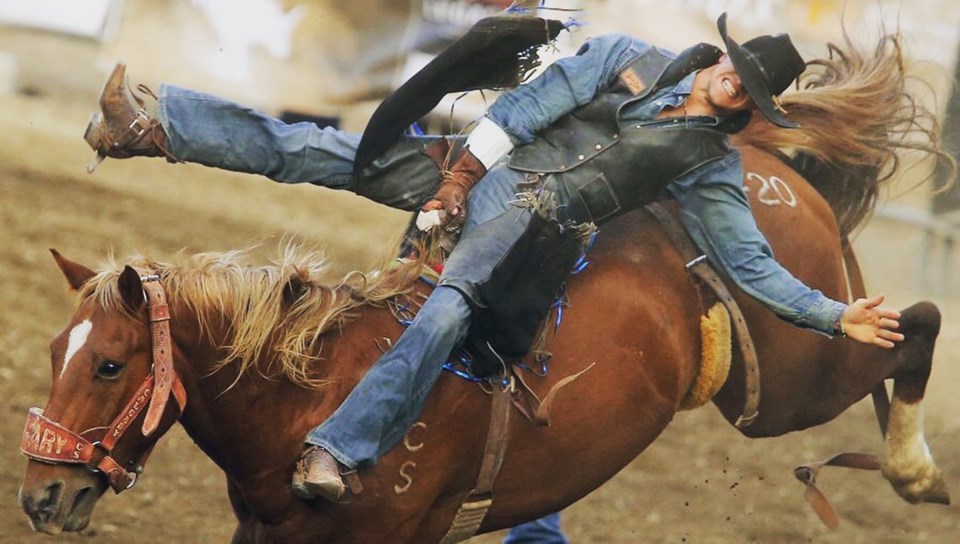This is the third part of Struggling for Hope, an eight-part special feature series examining the intersections between economic instability and mental health needs. Read our introduction to the series here.
- Part 1: 'It hurts': Workers grapple with the mental impacts of Alberta's recession
- Part 2: Farmers shed light on silent fight against mental illness
- Part 4: ‘There were some dark nights’: Oilfield workers fight for jobs and hope as industry flounders
- Part 5: 'It's scary': Camp lifestyle stretches oilfield workers to the breaking point
- Part 6: 'He was the best guy': Questions, grief and advocacy follow suicide deaths
- Part 7: 'It did get taken out on me': Domestic abuse climbs during economic downturn, pandemic
- Part 8: 'I couldn't reach him any more': Substance use rises with recession, pandemic
As a bareback rodeo athlete living on a farm near Carbon, Alta., Cole Goodine is used to spending every weekend competing across North America.
But this year, as COVID-19 shut down most rodeo events, he's spending his weekends at home.
Goodine has struggled with depression for most of his adult life. Since the pandemic hit, his mental health has declined – though he works hard to manage his depression, the loss of rodeo has meant the loss of one of his major joys in life.
“I don't have those highs. So I just kind of plateaued all year. There's just no up and no down,” Goodine said.
Riding bareback gave Goodine a natural high. It also kept him occupied, which he says helped his mental health.
“Rodeo has always felt like my home. I’ve never been as comfortable as I am behind the chute at a rodeo. That’s my comfort zone,” he said.
“It gives you a purpose, a goal, and I’ve always found it a great way to fight against mental health problems.”
Aside from battling boredom at home, Goodine's income shrank since he stopped winning money on the weekends. His day job as a welder has slowed down as well.
"I've been working when there's work – it's just everything's really slow right now, too, which also doesn't help," he said.
Goodine has been managing his depression for so long that he feels confident navigating it through COVID-19 too. But he says he is worried about others in his industry who have had the rodeo rug pulled out from under them, and who could be grappling with loneliness and loss of income during this pandemic.
There's no clear timeline for when rodeo events may be able to start running again. Professional athletes across the country lost their incomes overnight when COVID-19 descended on Canada.
Brandon Thome, an athletic therapist and the executive director of the Canadian Pro Rodeo Sport Medicine Team, said the rodeo industry has suffered from this shutdown.“It hasn’t been all that great to be quite honest,” Thome said.
“There's been a lot more guys reaching out, needing to talk."
That's not always common, he added. In the last five years, Thome has seen a major culture shift in the sport, where athletes suddenly began talking openly about their mental health and the risks concussions could pose to their long-term mental wellbeing.
“Now it's not just the old cowboy way of suck it up and get on.”
Amy Monea, mental health therapist and owner of Heard Wellness Through Horses, based out of Carstairs, Alta, treats rodeo athletes and rural residents through equine therapy.
Monea said right now the rodeo community is grieving what has happened to their sport.
“It's almost like a loss of identity and a loss of purpose and having to pivot really quickly from the end of March until now, and not sure when that's going to come back,” Monea said.
 Amy Monea is a mental health therapist and owner of Heard Wellness Through Horses, based out of Carstairs, Alta. She treats rodeo athletes and rural residents through equine therapy. SUPPLIED PHOTO
Amy Monea is a mental health therapist and owner of Heard Wellness Through Horses, based out of Carstairs, Alta. She treats rodeo athletes and rural residents through equine therapy. SUPPLIED PHOTOA similar struggle can happen for rodeo athletes who retire and feel that they've lost their identity and community, but Monea said COVID-19 is different because the athletes have no control over these circumstances. Additionally, staying connected through phone calls doesn't quite replace sitting in a car together every day and sharing the highs and lows of life with your best friends.
“The whole community had the rug ripped out from under them at the same time. It's what has to happen to keep everybody as safe as we can, but there is definitely a mental health and community grief that is happening and we aren’t even sure what we are grieving and how long its going to be,” Monea said.
Loss of community
Some rodeo athletes are feeling the loss of their "rodeo family" – a community of people who were connected through travelling partners and who did the rodeo circuit together.
Jake Stemo, a professional bareback rider, spends April to November with his two travel buddies. The trio spends the entire time on the road together and can hit up to 80 rodeos during the four prime summer rodeo months. They, like many other rodeo travel partners, can start their week in Calgary, and make stops in Utah, California, Idaho and Wyoming before they come back up north to finish the week in Medicine Hat.
“I think honestly, my favourite part of rodeo is when it’s hard and you know you got a grind and maybe it's like you had a busy week coming up ... it's just when you're driving all night and it’s four in the morning, and you’re going from California to Utah and you're listening to music – it's always those memories that really stick with me,” Stemo said.
He's holding onto those memories while stuck at home dealing with this pandemic.
“They are your guys. You got to support each other, because it is hard, and if you're not having fun or if one guy's down his luck or one guy's sore ... it’s when you are in the truck together with your best friends. You're bonded in that way, doing it together, and it’s a lifestyle and it's fun,” Stemo said.Monea said the loss of travelling partners and being around your closest friends all the time is a loss of a co-regulation opportunity. The travelling partners can be considered a buffer that can mitigate mental health problems, and having a group of people around you can help regulate your behaviour.
Community is an important element of mental health, she said.
On top of losing co-regulation opportunities, athletes now have fewer eyes on them, checking in on their mental health.
“If I'm travelling with somebody and I start to notice that they're not doing well, or their behaviours (are) changing, or they're not talking as much, I can check in with that as a friend. However, if I don't have that opportunity, then it’s a phone call and trying to check in that way. So that's something that's lost,” Monea said.
 Jake Stemo is a professional bareback rider. SUPPLIED PHOTO
Jake Stemo is a professional bareback rider. SUPPLIED PHOTOCowboy culture
One of the barriers for talking about mental wellbeing in rodeo, Thome said, has been masculine cowboy culture.
“It's men in general, to be quite honest. It’s the rough and tough (image) and that stigma of not talking about anything. It just transpires even bigger into the male-dominated sport."
Other sports, like hockey and football, also carry that same ultra-masculine tough image, which stigmatizes taking breaks even for injuries. The cowboy image that comes along with rodeo can make that even roe difficult, Thome noted. But despite that image, he is trying to let athletes know they can still be tough and seek help at the same time.
“What's been happening in the last 15 to 20 years is that we have been trying to break that down and get that out of guys' and girls' heads in the western lifestyle. We want them to know you don't have to be okay and we're here to help – there's people here to help you,” Thome said.Before Ty – and after
While a slow culture shift has been building around reaching out for help, one event completely changed how many rodeo athletes viewed mental health and concussions.
Ty Pozzobon, a world champion bull rider at the top of his sport, died by suicide in 2017. Pozzobon, from Merritt, B.C., was known by many in the industry as being warm and charismatic. His death shocked the industry.
“It felt like that loss stopped the community in its tracks, and at the same time we're having a big shift in terms of talking about reducing stigma around mental health and mental illness,” Monea said.
Thome said after Pozzobon’s death, it was like a dam had burst – calls flooded in for help, and people were suddenly willing to talk about their own mental health struggles. The difference in awareness about mental health issues was like night and day.
“You start to realize that there were some people that had some problems.”Thome said it was fantastic to hear from so many athletes, but he was suddenly overwhelmed with all the calls. The executive director pulled together psychologists, therapists, education and literature for athletes.
“That’s when we started to build out a different side of our sports medicine program,” Thome said.
Jared Parsonage, a bull rider from Maple Creek, Sask., said Pozzobon’s death brought a sudden awareness to the community about mental health.
“It opened people’s eyes a little bit,” Parsonage said of Pozzobon’s death.
“It’s a crappy way for things to change, but you have to find a good thing about it.”
Along with the surge in mental health awareness, Pozzobon's death helped bring the link between concussions and mental wellness to the forefront.
At the time of his death, Pozzobon’s family said they suspected his death was related to repeated head injuries and concussions he sustained during his rodeo career. They donated his brain to the University of Washington, and the neurologist found evidence of a chronic brain condition caused by concussions.
Doctors found Pozzobon suffered from chronic traumatic encephalopathy or CTE. He was the first bull rider to receive that diagnosis. Neurologists also found evidence of chronic traumatic axonal injury – a key predictor of head trauma, and an injury Pozzobon was aware of before his death.
Thome said there is a strong link between CTE and mental health struggles, including depression and suicide. CTE can only be diagnosed post-mortem and is typically found in college and professional football players, athletes in other contact sports and military members.
While medical professionals have just started to look into the link between concussions and mental wellbeing, the first findings are drawing a strong link between head injuries and mental health issues.
One in five people may experience mental health symptoms up to six months after a mild traumatic brain injury, a 2019 American National Institute of Health study found.
“Scientists also identified factors that may increase the risk of developing post-traumatic stress disorder (PTSD) and/or major depressive disorder following mild mTBI or concussion,” a news release on the study read.
“The results showed that at three and six months following injury, people who had experienced mTBI were more likely than orthopedic trauma patients to report symptoms of PTSD and/or major depressive disorder.”
Three months after the injury, 20 per cent of mild traumatic brain injury patients reported mental health symptoms, compared to 8.7 percent of orthopedic trauma patients. At six months after injury, mental health symptoms were reported by 21.2 percent of people who had experienced head injury and 12.1 percent of orthopedic trauma patients.
“Contrary to common assumptions, mild head injuries can cause long-term effects. These findings suggest that follow-up care after head injury, even for mild cases, is crucial, especially for patients showing risk factors for PTSD or depression,” study author Murray Stein, professor at the University of California San Diego, said in a release.
Thome said the industry has been working with head safety and concussions for “as long as he can remember” but it can still be difficult to communicate the danger of head injuries to athletes.
“In the western lifestyle industry, it's a hard nut to crack when it comes to injury,’ Thome said.
The industry has its own concussion protocols that it tries to follow.
“But at the end of the day in professional rodeo, they're contractors, and so we don't have jurisdiction to tell them that they can't go,” Thome said.
One of the challenges rodeo athletes face is that if they don’t compete, they don’t get paid. Even when they compete, only the best athletes get paid, Thome said – but they don’t have even a chance at a cheque unless they ride in their event.
For athletes supporting families or in need of a paycheque, this may give them extra motivation to ride with an injury.
On top of it all, athletes have to pay to compete in events and the costs of travel and accommodations aren’t covered, so if athletes have paid hundreds of dollars to get to the event, they may have even more motivation to ride when they aren’t healthy.
Policing each other
But after Pozzobon’s death, Thome said athletes are much more likely to sit out an event if they had a concussion.
“A lot of the cowboys are starting to police each other, they are starting to police their travel mates – just because, when it comes to concussions you are not really using all of your thinking skills to make the right decision,” Thome said.
“If your buddies or the sports medicine team is kind of helping you make up your mind on whether you should or you shouldn't get on, it makes it easier.”
Still, these cultural changes in the sport are still slow. Thome said the top athletes in the sport have to lead the change so all of the younger up-and-coming competitors will realize that in order to be the best, you have to take care of your physical and mental health.
But head injuries aren't the only risk impacting athletes' mental health, Thome noted – getting any injury can deal a devastating blow to the athlete's mental health. Just like in any other sport, the timing of injuries plays an important role.
If an athlete suffers a broken leg at the start of the season, they still may have a chance to ride that year. If they break their leg before the biggest rodeo event of the season, they may be devastated.Thome said having to sit out months of rodeo, alone and healing at home, can be hard to take.
Still, some rodeo athletes see a silver lining in sitting out the rodeo season: the chance to reconnect with another important community in their lives – their families.
Stemo said because he is on the road for eight months of the year, he misses time with his family all summer long."(COVID's) not that bad because I get to see my family. So I got more family time this year ... than I have in the last four or five years.
"That was a good thing for me. I got to do things with my family that I normally miss over the summers because I am always travelling."
Jennifer Henderson is the Local Journalism Initiative Reporter for Great West Newspapers, covering rural Alberta issues.
Resources
If you or someone you know is struggling with mental health issues, you can call Alberta's 24-hour mental health helpline 1-877-303-2642.
The addiction helpline can be reached at 1-866-332-2322 and is also available 24/7.
If you are having suicidal thoughts or you know someone who is, you can get help by calling the Canada Suicide Prevention Service at 1-833-456-4566 or by texting 45645.
Alberta's community and social services helpline can be reached by dialing 211. The 24-hour distress line is 780-482-4357 (HELP).
The rural distress line for northern Alberta is 1-800-232-7288.
If you or someone you know is at risk of an immediate crisis, call 911.




